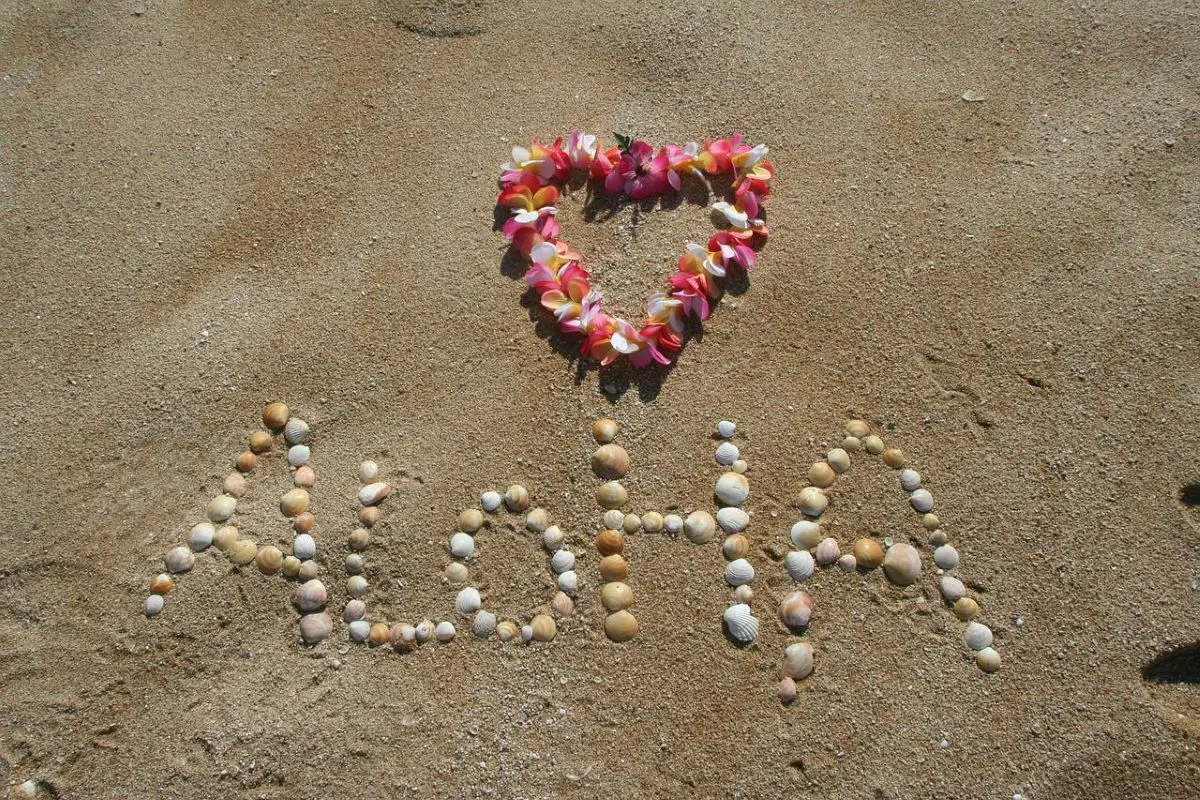Everybody can use a little more aloha in their lives. Especially if you’re planning your vacation to Hawaii, where Aloha is heard everywhere. If you’re like most people, though, you’re wondering what does aloha mean and how do you say it?
Used as both a greeting and a farewell, the word aloha has many meanings. Among them, it can be translated to mean “love” or “affection,” “peace,” “compassion,” and “mercy.” It can also be used in a more general sense of hello and goodbye.
But what does aloha mean? This word can also be used to express good wishes for another person—a wish for them to experience joy, peace, and happiness. It is a state of mind that you can express not only with words but with your actions as well.
In the Hawaiian language, there are no capital letters or punctuation, so aloha is spelled the same whether it is being used to mean hello or goodbye. Although many people have been led to believe that aloha means hello and aloha kakahiaka means good morning and aloha ahiahi means good evening and aloha auinalā means good afternoon, this is not correct.
Where Did The Word Aloha Originate?
Originating on an island off the coast of Hawaii; the last two kings of Hawaii were exiled, the word Aloha means “hello” in Hawaiian and is a greeting that was given to Captain Cook when he arrived in 1819. The Hawaiians greeted Cook when he arrived; they believed that he was bringing their first fruits and flowers, which has become the custom for all visitors to Hawaii today.
What Language Is Spoken in Hawaii?
The official languages of Hawaii are English and Hawaiian. The Hawaiian language is used by the state government, and English is used in day-to-day life throughout the islands. While there are no legal prohibitions against speaking other languages, the state of Hawaii does not recognize any other language as being equal to English or Hawaiian.
Hawaii has a rich history of languages. The first settlers spoke ancient Polynesian dialects that have evolved over time into what is now known as Hawaiian. The Hawaiian language was first written down by Westerners in the early 1820s; it wasn’t until 1822 that a group of Protestant missionaries arrived in Hawaii and began teaching their own language to people living on the islands.
What Does The Aloha Acronym Stand For?
Apart from asking what does aloha mean, people also wonder what the aloha acronym is. The aloha acronym has been around for decades and is deeply rooted in Hawaiian culture.
A: Akahai – In the Aloha acronym, a word that means “gentle” is akahai. This is often translated as “tenderness.”
It can also be used to describe kindness and can even refer to how something moves, such as when it’s smooth or graceful.
L: Lokahi – The 2nd letter in the Aloha acronym is L, which stands for Lokahi. Lokahi means “harmony” or “to come together in unity.” It can also mean “to work together in balance or agreement.” In Hawaii, people say that the practice of Lokahi helps to create a strong community. The concept of Lokahi is a very common idea in Hawaii; it’s important to be part of a community and contribute to it.
Lokahi encourages Hawaiians to cooperate with each other and help each other out. This idea can be found all over Hawaii; in the way people get together to do cleaning or maintenance on their neighborhood, for example, or by helping someone who is sick or injured.
O: Oluolu – Oluolu is a Hawaiian word that means “agreeable,” “pleasant,” or “pleasing.” The word is often used to describe the weather; it appears frequently in the Hawaiian language.
H: Haahaa – The “Haahaa” in the Aloha acronym stands for happiness.
Aloha is the Hawaiian word for love, compassion, and mercy. When it is used as a greeting or salutation, it is generally understood to mean “good wishes to you,” or in its most basic form, “hello.” However, the word has many other meanings so there is no straight answer to what does aloha mean.
It can also be translated as “blessing,” as in a blessing that is given or received. It also means “to take pity on,” which gives some insight into the meaning of the word in general. The Hawaiian language contains many words that combine two words together to create a new meaning. For example, aloha means love and haahaa means happiness. So when you combine the two together, you have aloha haahaa which can be translated as “love happiness.”
What Does The Hawaiian Culture Entail?
The Hawaiian culture is rich with history and tradition, and it has had a huge impact on the world. The term “Hawaiian culture” refers to the various customs, arts, traditions, and other practices of the native people of Hawaii. Hawaiian culture dates back thousands of years, with influences from Polynesian, European, American, and Asian cultures.
The Hawaiian language is an integral part of Hawaiian culture. It is one of the official languages of Hawaii and is spoken by more than 8,000 people in the state. The Hawaiian language has its own alphabet and grammar rules that are based on ancient Polynesian languages.
The history of Hawaii’s culture can be traced back to pre-contact times when the islands were first settled by Polynesians. Today there are thousands of Hawaiians who identify as Native Hawaiian or Kanaka Maoli (an indigenous group). There are also many Hawaiians who were born in other countries but have lived in Hawaii for most or all their lives. These groups all contribute to different aspects of Hawaiian culture.
Conclusion
Whether you are confused by the greeting or know whether it is a greeting, Aloha is a word that you can never go wrong with when you need to reach out to a person. Also, many people like to use this greeting because it goes well with everything in life.
You May Like These Articles As Well:
 Being Human
Being Human





